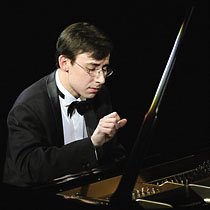 Alexander Kobrin filled the slot that the Washington Performing Arts Society’s Hayes Piano Series reserves for the winner of the quadrennial Van Cliburn competition. His program began with two Haydn sonatas, which are nice to see and hear. Not only does Haydn not get the due in this country that he should, but his sonatas are particularly slighted in concert. As usual with Haydn, he was extraordinarily prolific in that genre, writing 62 of them. Their relative lack of popularity and prominence notwithstanding, I’d wager that among these 62 you can find one for each that Mozart wrote that is as good as his younger colleague’s.
Alexander Kobrin filled the slot that the Washington Performing Arts Society’s Hayes Piano Series reserves for the winner of the quadrennial Van Cliburn competition. His program began with two Haydn sonatas, which are nice to see and hear. Not only does Haydn not get the due in this country that he should, but his sonatas are particularly slighted in concert. As usual with Haydn, he was extraordinarily prolific in that genre, writing 62 of them. Their relative lack of popularity and prominence notwithstanding, I’d wager that among these 62 you can find one for each that Mozart wrote that is as good as his younger colleague’s.If you missed Kobrin’s performance of the F major and E minor sonatas (nos. 29 and 34) this Saturday at the Kennedy Center’s Terrace Theater, then you might like to catch up on your Haydn with a more seasoned champion of that most Austrian of composers later this season when Alfred Brendel will include Papa Haydn’s D major sonata no. 42 in his recital on February 7th.
Kobrin played the two sonatas dry and nimbly, never prone to linger over notes unduly. The Presto of the E minor sonata came especially came across as closer to C.P.E. Bach than Mozart or early Beethoven. Compared to recorded artists, he was closer to the redoubtable Jenö Jando on his dry and matter-of-factly Naxos cycle than the warmer and more passionate Brendel or Andsnes. In some of the faster passages (and they were fast) he reminded briefly of the tok-tok-tok of Glenn Gould’s excellent but idiosyncratic recordings of the last 6 sonatas, but Kobrin employed more feeling and legato in softer segments, achieving a mellifluous element that Gould chose to ignore. Probably aided by the work itself, Kobrin showed more variety of mood and greater sensitivity in the marvelous E minor sonata.
Kobrin entered a different realm with Schumann’s Kinderszenen, op. 15. “Von fremden Ländern und Menschen” was distant and dreamlike enough to convince those of the greatness of Schumann’s piano music that only know it to be great but don’t always feel it that way. More moving in the gentler episodes, “Bittendes Kind” stood out, “Träumerei” a little less so. “Der Dichter spricht” was full of appropriate gravitas and the awe and reverence that Schubert imbued the scene with. I’ve heard Kinderszenen three times in the last year or so and this was by some measure the best of those. Admittedly, Lang Lang’s muted and bland performance in April didn’t set the bar very high.
Alexander Kobrin, Van Cliburn Competition Recitals |
Variations on a Theme by Corelli, op. 42, followed, and Kobrin lulled the audience into its realm with a performance more seductive than energizing. Despite a broad dynamic range and contrasting timbres, everything was part of a seamless whole. Man’s victory over the machine came with the first and only slips of Kobrin’s towards the end of the variations. Between the vocal cheers from sold-out (but not full) Terrace Theater Kobrin threw two short and much appreciated Chopin prelude encores. A recording of his best performances during the Van Cliburn competition has been made available by Harmonia Mundi earlier this year.